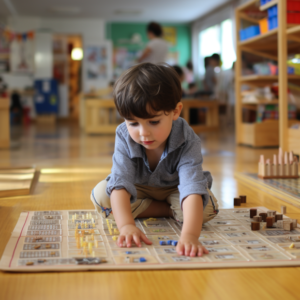In the remarkable world of Montessori education, Maria Montessori identified a fascinating phenomenon known as the “Sensitive Period.” These critical windows of time are unique stages in a child’s development when they possess an intense readiness and receptivity to learn specific skills. As educators and parents, understanding and harnessing the power of these sensitive periods are essential for fostering optimal growth and development.
Observing the Signs: Identifying Sensitive Periods
One of the cornerstones of the Montessori approach is keen observation. By closely observing a child’s behavior and interests, educators and parents can identify the specific sensitive periods a child is experiencing. These periods may manifest in the child’s heightened interest and fascination with particular activities or concepts.
Language: The Sensitive Period for Communication
One of the most well-known sensitive periods is the language period, occurring in the early years of life. During this time, children absorb language effortlessly and eagerly. Montessori environments are thoughtfully designed to immerse children in rich language experiences, from conversations with educators to a wide array of language materials that stimulate vocabulary development and language fluency.
Movement: The Sensitive Period for Physical Exploration
The sensitive period for movement unfolds during infancy and early childhood. It is a time when children are driven to explore their physical capabilities and refine their motor skills. In the Montessori environment, opportunities for movement abound, with carefully curated materials and activities that promote both fine and gross motor development.
Order: The Sensitive Period for Organization
Children are naturally drawn to order and structure, especially during their early years. Montessori classrooms cater to this sensitive period by providing an organized and aesthetically pleasing environment. With designated spaces for materials and activities, children develop a sense of security and inner peace.
Socialization: The Sensitive Period for Building Relationships
As children grow and interact with others, they go through a sensitive period for socialization. Montessori educators foster a sense of community in the classroom, promoting cooperation, empathy, and conflict resolution. By facilitating positive social interactions, children develop essential social skills and emotional intelligence.
Independence: The Sensitive Period for Autonomy
During the sensitive period for independence, children eagerly seek autonomy in their daily activities. Montessori classrooms are structured to support this need, offering opportunities for self-directed learning and practical life activities that promote self-sufficiency and decision-making.
Grace and Courtesy: The Sensitive Period for Politeness
As children mature, they exhibit a sensitive period for grace and courtesy. Montessori education places a strong emphasis on teaching children manners, respect, and empathy for others, fostering an environment of kindness and cooperation.
Utilizing Sensitive Periods: Nurturing Optimal Growth
Understanding sensitive periods allows educators and parents to tailor learning experiences that align with a child’s natural developmental inclinations. By providing an environment rich in activities that correspond to each sensitive period, children experience joyful and purposeful learning, maximizing their potential for growth and exploration.
Conclusion
The sensitive periods in Montessori education provide a profound insight into a child’s inner world, guiding educators and parents in creating nurturing learning environments. By observing and embracing these unique phases, we can unlock the full potential of a child’s developmental journey. Montessori’s approach encourages us to respect and support each child’s individual growth, promoting a love of learning that lasts a lifetime.

